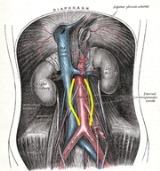Why there is decreased hemoglobin and hematocrit in abdominal aortis aneurysm?
replied to: bangus
Replied to: Why there is decreased hemoglobin and hematocrit in abdominal aortis aneurysm?...
This may be coincidental; many conditions lead to decreased hemoglobin and hematocrit (anemia). Tracing the exact cause of anemia can be complex and is not necessarily tied to a AAA.
Aneurysms may occur in any artery in the body and may be due to any of a variety of causes. Most common is the process of athersclerosis ("hardening of the arteries") which is a natural process occurring at varying rates in all people, but accelerated by both inherited factors and life style factors (diabetes, high blood pressure, high cholesterol, smoking, etc.). Other, less common, causes are trauma or abnormal configuration at junctions or branches of arteries.
A potential cause of anemia relating to abdominal aneurysms which may of significant medical concern is blood loss caused by leaking from the aneurysm (which is usually painful and occurs in greater enlarged aneurysms. Another is "dissection" where the wall of the artery is weakened, and blood penetrates between layers of the artery wall, collect in pools of blood trapped in that location. Very large collections can become sequestered in this manner. This is also usually painful but not necessarily if the process is slow.
If anemia occurs because of either of the above causes, it represents an urgent medical condition which almost always requires immediate surgery to correct. The decision for surgery is complex and depends on the actual findings after physical examination and imaging studies.
A primary doctor may be able to determine whether the anemia is actually due to the aneurysm or some other unrelated process. One should seek consultation with a vascular surgeon on recommendation of his/her primary care physician at the soonest time to explore this issue further.
Ed Draper MD
Medical Care Consultant

